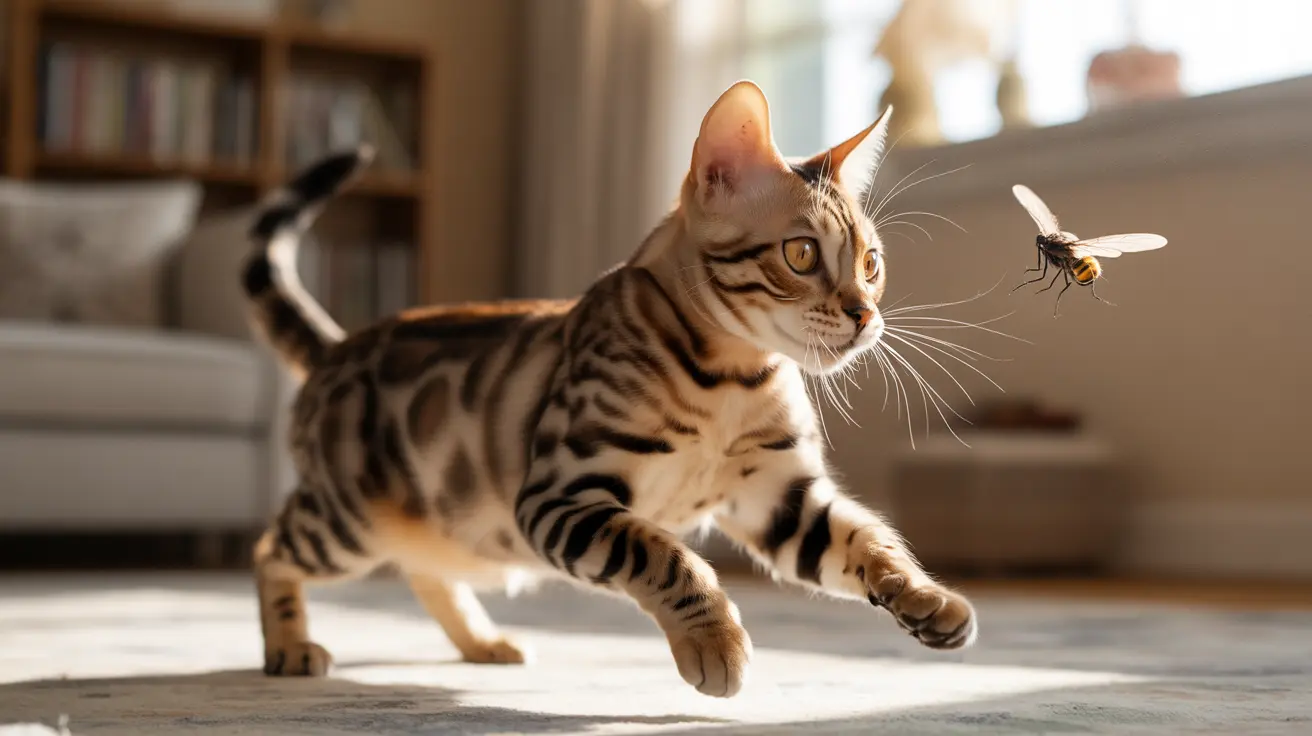It's a common scenario: you notice your cat stalking and eventually catching a buzzing housefly, followed by the swift gulp that tells you they've eaten it. While watching our feline friends exercise their natural hunting instincts can be entertaining, it's natural to wonder about the potential health implications of fly consumption.
In this comprehensive guide, we'll explore the risks associated with cats eating flies, signs of potential complications, and when you should seek veterinary attention. We'll also provide practical prevention tips to help protect your furry friend from fly-related health issues.
Understanding the Risks of Cats Eating Flies
While a single fly usually isn't dangerous for healthy adult cats, there are several potential risks to consider:
Bacterial Contamination
Flies are notorious for landing on unsanitary surfaces like garbage, feces, and decomposing matter. When cats eat these insects, they can ingest harmful bacteria that may cause gastrointestinal upset.
Parasitic Infections
Flies can carry various parasites, including protozoa like Isospora (coccidia). These parasites are particularly concerning for kittens and cats with compromised immune systems, potentially leading to diarrhea and weight loss.
Pesticide Exposure
Perhaps the most serious risk comes from flies that have been exposed to insecticides. If a cat eats a contaminated fly, they might experience toxicity symptoms ranging from mild to severe.
Symptoms to Watch For After Your Cat Eats a Fly
Immediate Warning Signs
- Excessive drooling
- Difficulty breathing
- Gagging or choking
- Unusual lethargy
- Body tremors or twitching
Delayed Symptoms
- Vomiting
- Diarrhea
- Loss of appetite
- Abdominal pain
- Unusual behavior changes
When to Contact Your Veterinarian
Most healthy adult cats won't experience serious issues from eating a single fly. However, certain situations warrant immediate veterinary attention:
Emergency Situations
- Persistent vomiting or diarrhea lasting over 24 hours
- Signs of respiratory distress
- Severe lethargy or collapse
- Neurological symptoms like tremors or uncoordination
- Known exposure to pesticides or toxic substances
Prevention and Safety Measures
To minimize the risks associated with your cat eating flies, consider implementing these preventive measures:
- Install and maintain window screens
- Use pet-safe fly control methods
- Keep garbage sealed and dispose of it regularly
- Clean litter boxes frequently
- Provide engaging toys to redirect hunting behavior
Frequently Asked Questions
Is it safe if my cat ate a fly once, or should I be worried?
A single fly is usually harmless for healthy adult cats. However, monitor your cat for 24 hours for any unusual symptoms like vomiting, diarrhea, or lethargy.
What are the signs that my cat might be sick after eating a fly?
Watch for symptoms like excessive drooling, vomiting, diarrhea, difficulty breathing, tremors, or unusual lethargy. If these occur, contact your veterinarian.
Can flies carry parasites or toxins dangerous to my cat?
Yes, flies can carry bacteria, parasites, and pesticide residues that may be harmful to cats. The risk is higher for kittens and cats with compromised immune systems.
When should I take my cat to the vet after it ate a fly?
Seek immediate veterinary care if you notice severe symptoms like persistent vomiting/diarrhea, breathing difficulties, tremors, or extreme lethargy, or if you suspect the fly was exposed to pesticides.
How can I prevent my cat from eating flies and reduce health risks?
Install proper screens, maintain cleanliness, use pet-safe pest control methods, and provide alternative forms of entertainment to satisfy your cat's hunting instincts.
Conclusion
While watching your cat catch and eat a fly can be concerning, understanding the potential risks and knowing what signs to watch for can help you make informed decisions about your pet's health. Most healthy cats will handle an occasional fly without issues, but being vigilant and knowing when to seek veterinary care ensures your feline friend stays safe and healthy.






